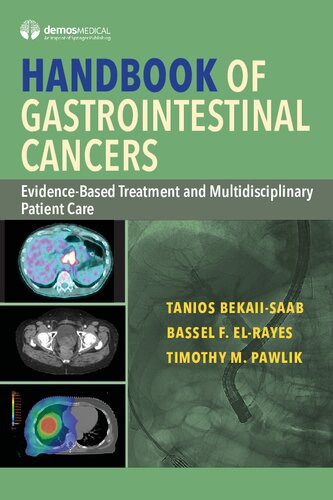

Most ebook files are in PDF format, so you can easily read them using various software such as Foxit Reader or directly on the Google Chrome browser.
Some ebook files are released by publishers in other formats such as .awz, .mobi, .epub, .fb2, etc. You may need to install specific software to read these formats on mobile/PC, such as Calibre.
Please read the tutorial at this link: https://ebookbell.com/faq
We offer FREE conversion to the popular formats you request; however, this may take some time. Therefore, right after payment, please email us, and we will try to provide the service as quickly as possible.
For some exceptional file formats or broken links (if any), please refrain from opening any disputes. Instead, email us first, and we will try to assist within a maximum of 6 hours.
EbookBell Team

4.0
36 reviewsHandbook of Gastrointestinal Cancers is a practical guide to the management of colorectal, pancreatic, hepatocellular, gastric, and esophageal cancers as well as other cancers of the upper and lower gastrointestinal tract. Edited by a multidisciplinary group of oncologists from leading institutions, this book is an essential day-to-day reference for evidence-based treatment and patient care. The handbook focuses on treatment strategies and approaches to cancerous gastrointestinal tumors that are transforming the recent oncological landscape, including expert-given guidance on methods such as neoadjuvant and adjuvant chemotherapy, surgical transplant, radiation therapy, molecular diagnostic testing leading to molecularly targeted therapy, and immunotherapy.
With so many advances in the current field, it is increasingly difficult for early-career practitioners to grasp the entirety of practices and for seasoned oncologists to keep up with newly approved therapies, side effects to treatments, and special clinical management considerations, but this handbook addresses it all. Organized by major gastrointestinal disease sites and featuring “How I Treat” case vignettes from world experts for common and uncommon management considerations, the handbook brings an experience-based perspective to these tough-to-treat areas. The treatment strategies and applications set forth in the chapters are pertinent to situations and decision-making encountered in practice. Handbook of Gastrointestinal Cancers is a valuable resource for medical oncologists, radiation oncologists, and surgeons treating and managing gastrointestinal cancers as well as trainees in medical, radiation, and surgical oncology programs needing an accessible point of care resource.
KEY FEATURES: